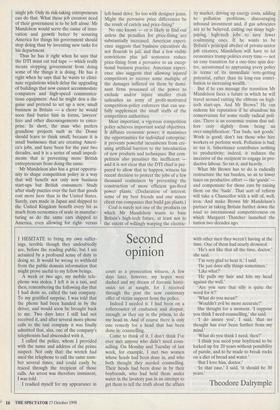Second opinion
I HESITATE to bring my own suffer- ings, terrible though they undoubtedly are, before the reading public, but I am actuated by a profound sense of duty in doing so. It would be wrong to withhold from the public domain information that might prove useful to my fellow beings.
A week or two ago, my mobile tele- phone was stolen. I left it in a taxi, and then, remembering the following day that I had done so, called the taxi company. To my gratified surprise, I was told that the phone had been handed in by the driver, and would soon be brought back to me. Two days later I still had not received it, and after several more phone calls to the taxi company it was finally admitted that, alas, one of the company's telephonists had absconded with it.
I called the police, whom I provided with the name and address of the prime suspect. Not only that: the wretch had used the telephone to call the same num- ber several times, and could easily be traced through the recipient of those calls. An arrest was therefore imminent, I was told.
I readied myself for my appearance in court as a prosecution witness. A few days later, however, my hopes were dashed and my dream of forensic histri- onics set at naught, for I received through the post the now customary offer of victim support from the police.
Indeed I needed it. I had been on a rollercoaster of exultation and despair, enough, as they say in the prison, to do my head in. And of course there is only one remedy for a head that has been done in: counselling.
Come to think of it, I don't think I've ever met anyone who didn't need coun- selling. On Monday and Tuesday of last week, for example, I met two women whose heads had been done in, and who both thought they needed counselling. Their heads had been done in by their boyfriends, who had held them under water in the lavatory pan in an attempt to get them to tell the truth about the affairs with other men they weren't having at the time. One of them had nearly drowned.
`He's not like that all the time, doctor,' she said.
`I'm very glad to hear it,' I said.
`He just does silly things sometimes.' `Like what?'
`He pulls my hair and hits my head against the wall.'
`Are you sure that silly is quite the word for it?'
`What do you mean?'
`Wouldn't evil be more accurate?'
She thought for a moment. 'I suppose you think I need counselling,' she said.
`I do assure you', I said, 'that no thought has ever been further from my mind.'
`What do you think I need, then?'
`I think you need your boyfriend to be locked up for 20 years without possibility of parole, and to be made to break rocks on a diet of bread and water.'
`But I love him, doctor.'
`In that case,' I said, 'it should be 30 years.'
Theodore Dalrymple










































































 Previous page
Previous page